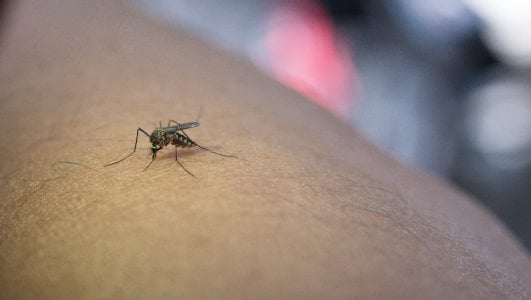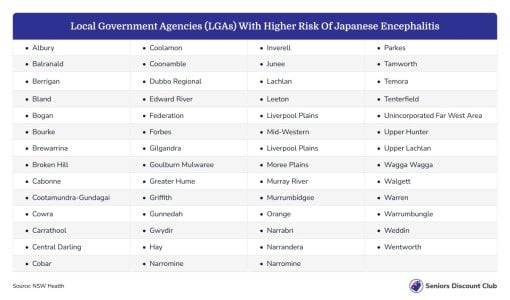Urgent warning: Dangerous mosquito virus spreads in several areas in this state
By
Seia Ibanez
- Replies 29
As the summer sun beams down and the days grow longer, many of us are eager to spend more time outdoors, enjoying the warmth and the beauty of nature.
However, NSW Health has issued a stark reminder that with the summer season comes a heightened risk of mosquito-borne diseases, particularly the potentially deadly Japanese encephalitis virus (JEV).
The warning comes after routine surveillance detected the virus in both mosquitoes and feral pigs across various regions in New South Wales.
This has prompted health officials to release a list of 55 local government areas (LGAs) that are considered high-risk zones for the transmission of this dangerous disease.

Japanese encephalitis is a virus that, while rare in its symptomatic form, carries a high fatality rate of nearly 30 per cent among those diagnosed.
Survivors can suffer from severe neurological conditions, with up to half experiencing permanent brain damage.
Symptoms, which typically appear five to 15 days after a mosquito bite, can range from mild, such as fever and headaches, to severe, including neck stiffness, tremors, seizures, and even coma.
Dr Jeremy McAnulty from NSW Health has expressed concern over the recent findings, emphasising that the current conditions are ideal for mosquito breeding.
‘The detections of JE virus near Griffith and Narromine indicate that the risk for JEV transmission is likely broad, particularly in the 55 NSW LGAs that have been identified to be at higher risk of JE in the inland regions of NSW,’ he said.
This increases the likelihood of JEV transmission, particularly in the identified inland regions of NSW.
The World Health Organization noted that globally, the majority of JEV cases occur in children under 15 years old.
To combat the threat, NSW Health advised residents to take proactive measures to protect themselves and their families.
This includes using mosquito repellents, applying insecticide sprays and coils, wearing long, loose-fitting clothing and covered footwear, and avoiding outdoor activities during peak mosquito times at dawn and dusk.
Repellent should be reapplied regularly, especially after swimming.
Moreover, it's essential to eliminate potential mosquito breeding grounds around your home. This means clearing out any items that can collect water, such as old tyres, empty pots, and containers.
For those with infants, using a baby carrier draped with mosquito netting and applying child-safe repellents can offer additional protection.
In response to the increased risk, Dr McAnulty said there was ‘a safe, effective, and free vaccine to protect against Japanese encephalitis’.
The vaccine is ‘available to anyone who lives or routinely works in these 55 LGAs and for people who work in some other high-risk occupations’, he said.
Eligibility for the vaccine extends to anyone aged two years or older who lives or works in the affected LGAs, spends significant time outdoors, is experiencing homelessness, lives in conditions with limited mosquito protection, or is involved in outdoor flood recovery efforts.

It's important to note that JEV cannot be transmitted from person to person and is not contracted through the consumption of pork. However, the risk of mosquito transmission remains a serious concern.
For more information on vaccinations and protection against JEV, visit the NSW Health website.

Have you taken steps to protect yourself from mosquito-borne diseases this summer? Share your tips and experiences in the comments below!
However, NSW Health has issued a stark reminder that with the summer season comes a heightened risk of mosquito-borne diseases, particularly the potentially deadly Japanese encephalitis virus (JEV).
The warning comes after routine surveillance detected the virus in both mosquitoes and feral pigs across various regions in New South Wales.
This has prompted health officials to release a list of 55 local government areas (LGAs) that are considered high-risk zones for the transmission of this dangerous disease.

NSW Health has warned that Japanese encephalitis virus has spread throughout the area. Credit: jcomp / Freepik
Japanese encephalitis is a virus that, while rare in its symptomatic form, carries a high fatality rate of nearly 30 per cent among those diagnosed.
Survivors can suffer from severe neurological conditions, with up to half experiencing permanent brain damage.
Symptoms, which typically appear five to 15 days after a mosquito bite, can range from mild, such as fever and headaches, to severe, including neck stiffness, tremors, seizures, and even coma.
Dr Jeremy McAnulty from NSW Health has expressed concern over the recent findings, emphasising that the current conditions are ideal for mosquito breeding.
‘The detections of JE virus near Griffith and Narromine indicate that the risk for JEV transmission is likely broad, particularly in the 55 NSW LGAs that have been identified to be at higher risk of JE in the inland regions of NSW,’ he said.
This increases the likelihood of JEV transmission, particularly in the identified inland regions of NSW.
The World Health Organization noted that globally, the majority of JEV cases occur in children under 15 years old.
To combat the threat, NSW Health advised residents to take proactive measures to protect themselves and their families.
This includes using mosquito repellents, applying insecticide sprays and coils, wearing long, loose-fitting clothing and covered footwear, and avoiding outdoor activities during peak mosquito times at dawn and dusk.
Repellent should be reapplied regularly, especially after swimming.
Moreover, it's essential to eliminate potential mosquito breeding grounds around your home. This means clearing out any items that can collect water, such as old tyres, empty pots, and containers.
For those with infants, using a baby carrier draped with mosquito netting and applying child-safe repellents can offer additional protection.
In response to the increased risk, Dr McAnulty said there was ‘a safe, effective, and free vaccine to protect against Japanese encephalitis’.
The vaccine is ‘available to anyone who lives or routinely works in these 55 LGAs and for people who work in some other high-risk occupations’, he said.
Eligibility for the vaccine extends to anyone aged two years or older who lives or works in the affected LGAs, spends significant time outdoors, is experiencing homelessness, lives in conditions with limited mosquito protection, or is involved in outdoor flood recovery efforts.

It's important to note that JEV cannot be transmitted from person to person and is not contracted through the consumption of pork. However, the risk of mosquito transmission remains a serious concern.
For more information on vaccinations and protection against JEV, visit the NSW Health website.
Key Takeaways
- NSW Health has issued a warning about the risk of Japanese encephalitis, a deadly mosquito-borne virus, in 55 council areas in inland NSW.
- The virus has been detected in feral pigs and mosquitoes, with Griffith and Narromine identified as particular areas of concern, prompting advice for at-risk residents to get vaccinated.
- The World Health Organisation indicates that although symptomatic cases are rare, the fatality rate is high among those who do become symptomatic, and survivors can be left with permanent brain damage.
- NSW residents in the identified areas are eligible for a free vaccine and are advised to take preventive measures against mosquito bites, such as using repellents, wearing protective clothing and removing stagnant water sources.
Last edited:







